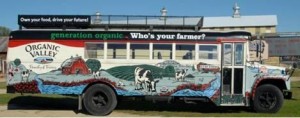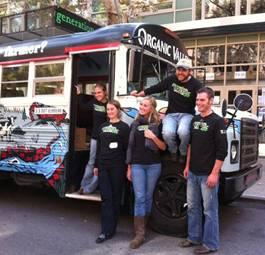On October 6th, a group of young organic farmers boarded a brightly painted, veggie-oil powered school bus in La Farge, Wisconsin to kick off the first ever Generation Organic Tour. During a two and a half week road trip, they visited schools, colleges and grocery stores to promote the theme of the tour: “Who’s Your Farmer? Own Your Food, Drive Your Future!”

Generation Organic or Gen-O, is a group of farmers aged 18-35, who are spreading the message about the viability of a career in organic farming. They are the newest members of Organic Valley, the nation’s largest organic farming cooperative and a leading brand of organic products.
According to the USDA Census of Agriculture, the average age of the farmers operating America’s 2.1 million farms is 57. This generational shift presents a huge challenge for the future of agriculture. The Gen-O campaign is working to reverse this trend by showing that organic farming can be a viable career path.
“If the average age of the farmer is over 50, who’s going to farm for us?” says Theresa Marquez, Organic Valley’s Chief Marketing Executive. Gen-O was born five years ago when Marquez had the idea of bringing together young organic farmers to share their experiences.
These young farmers are determined to urge consumers to “own their food,” and teach them about how personal food choices affect our health and our planet, explains Elizabeth Horton, Director of Public Affairs at Organic Valley.

Generation Organic is teaching consumers about the benefits of organic products and showing their peers just how cool farming can be. (Photo credit: Generation Organic)
Along the tour, the bus made stops at several college and university campuses including SUNY Binghamton, Oberlin, Williams, Brown, Harvard, Yale, Columbia and Barnard. The Gen-Os educated their peers about the benefits of organically grown food by giving presentations to campus sustainability groups and hosting grilled-cheese socials.
In New York City, they visited a Whole Foods Market, where they talked to consumers about the importance of going organic. And at PS 41, in Greenwich Village, the Gen-O team brought the farm into the classroom where they used planters to teach fifth graders about organic farming.
The tour concluded on October 21st, with a two day visit to the nation’s capital. Restaurant Nora, the first certified organic restaurant in the United States, hosted the Gen-O team for lunch. And the group also met with legislators to promote the importance of organic farming with the hope of influencing future discussions on agricultural policy.
The tour has helped young organic farmers from across the country connect with each other. “Most of us live in isolated areas where there aren’t other young people, and this [Gen-O] allows us to share our stories and ask each other questions,” says Sarah Mahaffy, a dairy farmer from Oregon.
Preston Green, 21, who splits his time between working on his family’s farm and studying agriculture business at the University of Wisconsin said, “The genuine question about ‘where does my food come from?’ is inspiring and empowering as a farmer because people are really starting to care, and we need to pay attention to the growing demand for that knowledge.”
As the new faces of sustainable agriculture, the Gen-Os are urging young consumers to choose organic and showing their peers just how cool farming can be.
Prepared by Janeen Madan, research intern with Nourishing the Planet.

Danielle Nierenberg, an expert on livestock and sustainability, currently serves as Project Director of State of World 2011 for the Worldwatch Institute, a Washington, DC-based environmental think tank. Her knowledge of factory farming and its global spread and sustainable agriculture has been cited widely in the New York Times Magazine, the International Herald Tribune, the Washington Post, and
other publications.
Danielle worked for two years as a Peace Corps volunteer in the Dominican Republic. She is currently traveling across Africa looking at innovations that are working to alleviate hunger and poverty and blogging everyday at Worldwatch Institute’s Nourishing the Planet. She has a regular column with the Mail & Guardian, the Kansas City Star, and the Huffington Post and her writing was been featured in newspapers across Africa including the Cape Town Argus, the Zambia Daily Mail, Coast Week (Kenya), and other African publications. She holds an M.S. in agriculture, food, and environment from Tufts University and a B.A. in environmental policy from Monmouth College.











